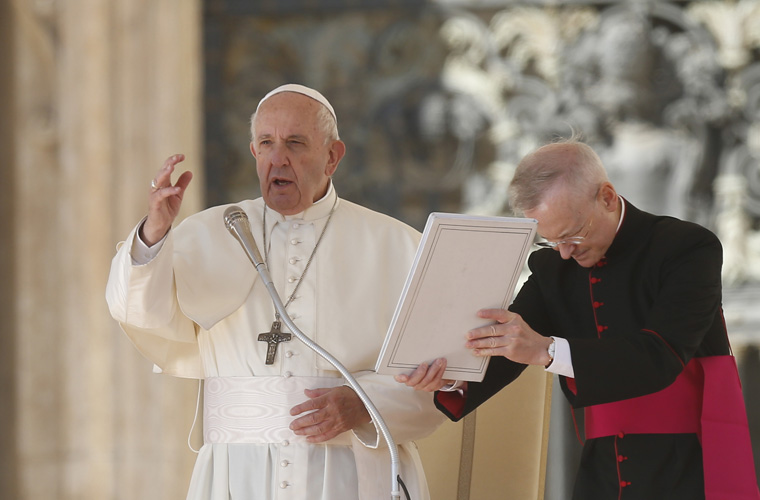By Cindy Wooden | Catholic News Service
VATICAN CITY (CNS) — Anyone who wants to experience the consolation and tenderness of God simply needs to go to confession, Pope Francis said at his morning Mass.
Celebrating the liturgy Dec. 10 in the chapel of his residence, Pope Francis recited an imaginary conversation:
“Father, I have so many sins, I’ve made so many mistakes in my life.”
“Let yourself be consoled.”
“But who will console me?”
“The Lord.”
“Where must I go?”
“To ask pardon. Go. Go. Be bold. Open the door. He’ll caress you.”
The Lord draws near to those in need with the tenderness of a father, the pope said.
Paraphrasing the day’s reading from Isaiah 40, the pope said, “He is like a shepherd who pastures his sheep and gathers them in his arms, carrying the lambs on his bosom and sweetly leading them back to their mother ewes. That’s how the Lord consoles us.”
“The Lord always consoles us as long as we let ourselves be consoled,” he said.
Of course, he said, God the father also corrects his children, but he does that, too, with tenderness.
Often, he said, people look at their own limits and sins and start thinking that there is no way God can forgive them. “It is then that the voice of the Lord is heard, saying, ‘I will console you. I am close to you,’ and he tenderly reaches us.”
“The powerful God who created the heavens and earth, the hero-God — if you want to say it that way — became our brother, who carried the cross and died for us, and is capable of caressing us and saying, ‘Don’t cry.’”
How to Go to Confession
May the Passion of Our Lord Jesus Christ, the intercession of the Blessed Virgin Mary and of all the saints, whatever good you do and suffering you endure, heal your sins, help you grow in holiness, and reward you with eternal life. Go in peace.
–Rite of Penance, no. 93
1. PREPARATION: Before going to confession, take some time to prepare. Begin with prayer, and reflect on your life since your last confession. How have you — in your thoughts, words, and actions — neglected to live Christ’s commands to “love the Lord, your God, with all your heart, with all your soul, and with all your mind,” and to “love your neighbor as yourself” (Mt 22:37, 39)? As a help with this “examination of conscience,” you might review the Ten Commandments or the Beatitudes (Ex 20:2-17; Dt 5:6-21; Mt 5:3-10; or Lk 6:20-26).
2. GREETING: The priest will welcome you; he may say a short blessing or read a Scripture passage.
3. THE SIGN OF THE CROSS: Together, you and the priest will make the Sign of the Cross. You may then begin your confession with these or similar words: “Bless me, Father, for I have sinned. It has been [give days, months, or years] since my last confession.”
4. CONFESSION: Confess all your sins to the priest. If you are unsure what to say, ask the priest for help. When you are finished, conclude with these or similar words: “I am sorry for these and all my sins.”
5. PENANCE: The priest will propose an act of penance. The penance might be prayer, a work of mercy, or an act of charity. He might also counsel you on how to better live a Christian life.
6. ACT OF CONTRITION: After the priest has conferred your penance, pray an Act of Contrition, expressing sorrow for your sins and resolving to sin no more. A suggested Act of Contrition is:
My God,
I am sorry for my sins
with all my heart.
In choosing to do wrong
and failing to do good,
I have sinned against you
whom I should love above all things.
I firmly intend, with your help,
to do penance,
to sin no more,
and to avoid whatever leads me
to sin.
Our Savior Jesus Christ
suffered and died for us.
In his name, my God, have
mercy.
(Rite of Penance, no. 45)
7. ABSOLUTION: The priest will extend his hands over your head and pronounce the words of absolution. You respond, “Amen.”
8. PRAISE: The priest will usually praise the mercy of God and will invite you to do the same. For example, the priest may say, “Give thanks to the Lord for he is good.” And your response would be, “His mercy endures for ever” (Rite of Penance, no. 47).
9. DISMISSAL: The priest will conclude the sacrament, often saying, “Go in peace.”
Copyright © 2013, United States Conference of Catholic Bishops, Washington, DC. Scripture excerpts taken from the New American Bible, rev. ed. © 2010, 1991, 1986, 1970 Confraternity of Christian Doctrine, Inc., Washington, DC.
All rights reserved. Excerpts from the English translation of Rite of Penance © 1974, International Committee on English in the Liturgy, Inc. All rights reserved.







